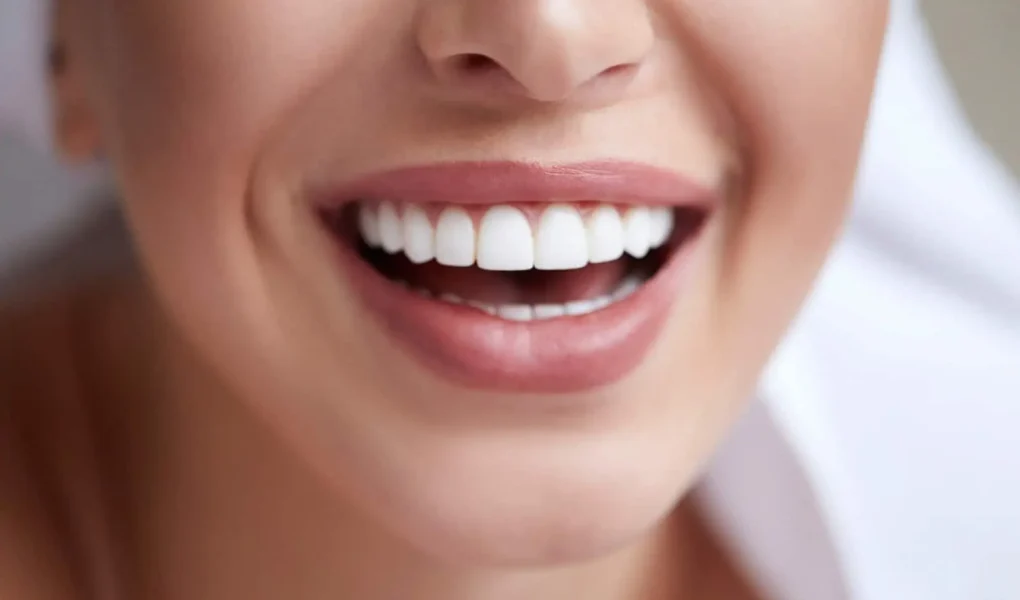Veneers are wafer-thin, tooth-coloured shells that are attached to the front surfaces of your natural teeth. Veneers are a cosmetic dental restoration that can conceal a variety of tooth issues, from gaps to chipped tooth to discoloration.
There are usually two types of veneers: porcelain veneers and composite veneers.
Composite veneers are made of resin, and porcelain veneers of porcelain. Composite veneers are more opaque than porcelain veneers, which may end up in a less natural-looking smile.
Porcelain is very similar to your tooth enamel, so they tend to look just like your teeth. Their shape, colour and size are fully customisable. This allows your smile to look as natural as possible and beautiful.
Many individuals choose porcelain veneers because they are able to give the smile an almost instantaneous boost.
Porcelain veneers are a great cosmetic dental solution for tooth and oral health issues including:
- Tooth enamel discoloration caused by aging, illness, tooth decay, aging, genetics or use of medications
- Chips or fractures in the teeth
- Gaps between the teeth
- Uneven or worn-down teeth
- Crooked teeth
- Teeth that appear longer than they should
Ideally, the teeth under your porcelain veneers should remain as strong and healthy as ever, but there’s a catch. With veneers, you must practice excellent dental hygiene. This means following all post-procedure instructions after having the veneers placed and brushing at least twice a day with a soft toothbrush and non-abrasive toothpaste. You also must commit to flossing at least once a day (yes, every day!) and visit your dentist for regular dental check-ups and cleaning (ideally twice a year). If you do your part, then porcelain veneers will do the rest (help protect and support your teeth).
As part of the tooth-preparation process, in order to effectively place porcelain veneers and achieve a beautiful and natural-looking smile, some of the tooth’s surface has to be reduced. Generally, only about 0.5mm of the tooth’s surface is removed in order to prepare for the veneer.
After the tooth’s surface is treated, your veneer is bonded/attached to the tooth surface with a bonding cement (adhesive material), which hardens under a specific type of light. This bonding cement adheres tightly to your tooth enamel, which helps to protect your natural teeth from the bacteria that can cause tooth decay. So, your smile is not only stunning, but also healthy! The bonding cement does not damage the tooth or tooth structure in any way.
If you’re looking for veneers to cover damaged or weakened teeth, veneers offer an additional level of protection against tooth decay and also help to preserve your tooth structure.
Practicing good oral hygiene is always a good idea because it helps promote good oral health and overall health, too! We also recommend that you see your dentist at least twice a year for dental check-ups and regular cleanings.
By taking these small steps mentioned above, your porcelain veneers will protect your teeth for many years. With proper care, the average lifespan of porcelain veneers is seven to 20 years.
But if you do not follow the proper care and oral hygiene routine recommended by your dentist when caring for your porcelain veneers, you could be at risk for a serious compromise of your tooth structure and tooth enamel.
For example, if you do not floss regularly, bacteria that are behind tooth decay can build up between the teeth. When this happens, they will attack the natural tooth enamel at the ends of the veneer. If this happens, the bacteria can start to eat away at the tooth enamel and cause a cavity. Cavities under cosmetic dental restorations are hard to detect, which means you may not realize you have a cavity until you feel discomfort.
Should a cavity go undetected for too long, you may end up having to have a root canal treatment to preserve your tooth. Or the dentist may be unable to restore the tooth, which will then have to be extracted to make way for a dental implant or other cosmetic dental restoration to restore your smile.
If you are thinking of getting porcelain veneers, it’s important to remember that the longevity of your results depends in large part on you and on how well you keep up your regular oral hygiene routine.
Porcelain veneers are a great option for smile makeovers because not only can they help treat both physical and aesthetic issues with your natural teeth, but they are also sturdy, resilient and, if looked after properly, can last for years without problems.
Are you ready for dental veneers?
As you can see, veneers can help with various tooth-related imperfections and issues. If you’re interested in getting this procedure done, speak with your dentist and see if they think that you could be a suitable candidate.
Your dentist will have a look at your teeth and overall oral hygiene to check. Having a new set of teeth can improve your smile and give you a confidence boost!




